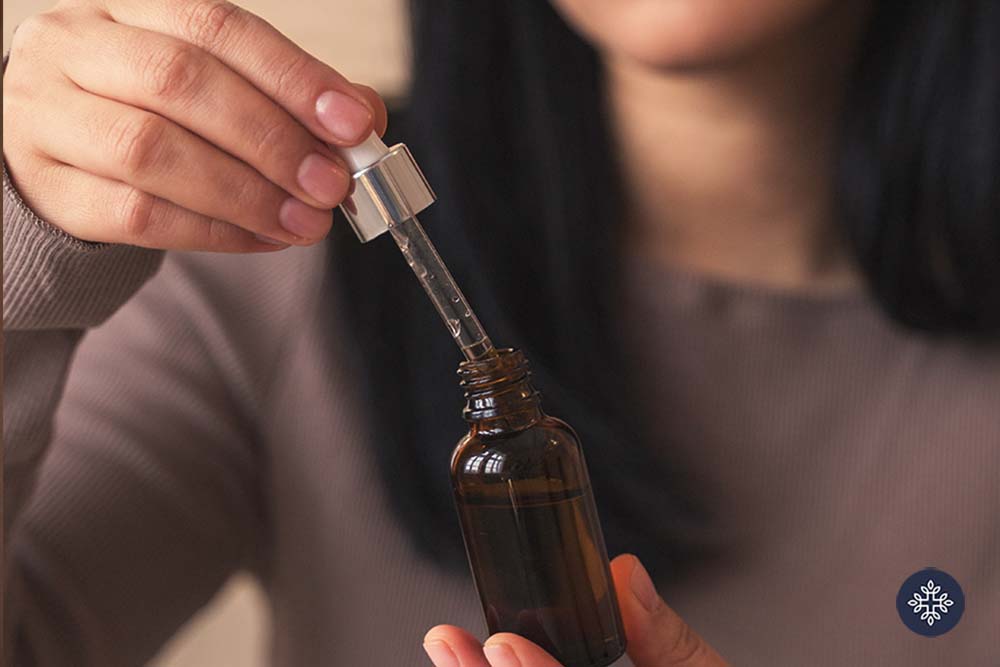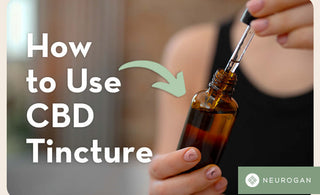CBD have been gaining (well-deserved) attention in the health and wellness space for the multitudes of benefits.
Whether you're a newcomer or looking to refine your CBD routine, we want to help you feel comfortable integrating CBD effectively into your wellness journey.
The CBD world can be overwhelming with its terminology and varying potential benefits. When looking to buy CBD products, you may see different names to describe these products. Whether it’s CBD oil, CBD drops, or CBD tinctures, it’s important to know the differences between these products and buy the right product for your specific needs.
From understanding dosage and administration methods to maximizing the potential benefits, get ready to master the use of CBD tinctures in this in-depth introduction.
What are CBD Tinctures?

Herbal tinctures and oils once had very distinct meanings, but now they are used interchangeably in the world of cannabis.
Let’s talk about these cannabis tinctures and how exactly CBD tincture might differs from CBD oil.
The term "tincture" is used to exclusively refer to a concentrated herbal extract that is typically dissolved in alcohol or another solvent. Nowadays, with advanced cannabinoid extraction techniques, we can efficiently extract concentrated compounds from cannabis and mix them with oils.
In the case of CBD tinctures, CBD is extracted from hemp plants, which are a variety of cannabis plants known for containing low levels of THC (tetrahydrocannabinol), the psychoactive compound associated with marijuana.
CBD oil tinctures are popular due to their ease of use, precise dosing, and relatively fast onset of effects when taken sublingually (under the tongue). They’re used by individuals seeking potential wellness benefits from supporting sleep, discomfort, stress, and general well being.
Within the categories of CBD tinctures, you have different types of extracts, each with unique characteristics based on the composition of the cannabinoids. So let’s go through the main types:
Full Spectrum CBD Tincture:
Contains a wide range of cannabinoids, including CBD, THC (within 0.3% legal limits), CBG, CBN, and others.
Harness the potential benefits of the entourage effect, where cannabinoids work together synergistically for enhanced therapeutic effects.
Broad Spectrum CBD Tincture:
Broad spectrum CBD contains a variety of cannabinoids, terpenes, and other beneficial compounds found in hemp, excluding THC.
Aim to provide the benefits of multiple cannabinoids without the psychoactive effects of THC.
CBD Isolate Tincture:
Contains pure CBD without any other cannabinoids, terpenes, or compounds from the hemp plant.
Suitable for individuals seeking the potential benefits of pure CBD oil alone, without the influence of other hemp-derived compounds.
When choosing a CBD oil tincture, it's essential to consider individual preferences, desired effects, and specific health goals.
Reading product labels, including information on third-party testing, can help consumers make informed decisions about the composition and quality of the tincture they choose.
What are CBD Tinctures Used For?
CBD tinctures are used for a variety of potential wellness purposes, as cannabidiol (CBD) interacts with the endocannabinoid system in the body, which is responsible for maintaining the balance of many physiological processes from stress, sleep, mood, immune response, pain response, and more.
While research on CBD benefits is ongoing, some users report experiencing the following benefits when using CBD tinctures or oils.
Calming Effects

The most common use for CBD oil is its calming properties, which many people use to maintain healthy stress levels and sleep cycles [1].
The calming effects vary based on individual response and CBD dosage, so it’s important to learn how much CBD your body positively reacts to.
Discomfort Support

Many individuals turn to CBD oil as a way to explore discomfort management, based on personal accounts and ongoing research into its potential to interact with the endocannabinoid system, which plays a role in mitigating pain perception and inflammation [2].
While research like this is promising, it’s not yet approved by the FDA for this use and more research is needed to fully understand its effects.
Mood Support

CBD is of interest to many for its potential to support mood regulation and provide a sense of inner peace.
There’s research to suggest that CBD may affect the signaling of serotonin receptors in the brain. Serotonin is a neurotransmitter often referred to as the "feel-good" chemical because of its role in promoting feelings of well-being and happiness.
By influencing these receptors, CBD may help to elevate mood and combat feelings of stress and nervousness, though more research is needed to fully understand this process [3].
It's essential to recognize that individual responses to CBD oil drops vary, and consulting with a healthcare professional is advisable before incorporating CBD tinctures into a wellness routine, especially for individuals taking medications or with underlying health concerns.
How do Hemp Tinctures Compare to CBD Tinctures?
The terms "hemp tincture" and "CBD tincture" are used interchangeably, as CBD is a prominent cannabinoid found in hemp plants.
However, there can be differences in terminology and product composition that might affect usage.
CBD tincture is a more specific term, indicating that the CBD tincture primarily contains cannabidiol extracted from the hemp plant/ CBD tinctures may include other cannabinoids found in hemp, but the focus is on CBD.
While hemp tinctures may also contain CBD, the term “hemp” is broader and could encompass a range of cannabinoids and other beneficial compounds found in the hemp plant. It might be used when the product’s profile extends beyond CBD alone.
There are also full spectrum oils like our Raw Scandinavian Oil tincture. This unique tincture is hemp-derived and contains 40000 mg of a variety of cannabinoids that provide potential health benefits, such as managing stressors and some kinds of discomfort.
How Do You Take CBD Tinctures?

Taking CBD oil drops is typically done sublingually (under the tongue) for efficiency, but it can also be added to food or drinks.
But when is the best time to take it? And what is the correct dosage? Here’s a guide on what you should know when you take CBD or THC oil tinctures.
- Time of Day: The optimal time to take CBD drops can vary based on individual factors, preferences, and the desired effects. Some people prefer taking full spectrum 3000mg tinctures or more in the morning to potentially promote a sense of calm and focus throughout the day.
- Others choose to take CBD tinctures in the evening to support relaxation and support a healthy sleep cycle. CBD's calming effects may be particularly helpful for winding down before bedtime.
- Ingestion: CBD tinctures can be taken with or without food. Some people prefer taking them with a meal to potentially enhance absorption, while others find it more convenient to take them on an empty stomach.
- It’s important to note that while sublingual administration is a common and effective method to take CBD oils, there are alternative ways to use CBD, such as adding it to food or beverages. However, when taken sublingually, the effects are generally faster due to direct absorption into the bloodstream.
- Dosage: Determining the appropriate dosage for CBD tinctures can depend on the individual body weight, metabolism, the severity of the condition being addressed, and personal experience or sensitivity to cannabinoids.
- Remember always to start low. Starting around 10 mg of CBD is recommended for CBD beginners.
- A CBD oil with 100 mg per serving is considered to be highly potent. The great thing about tinctures is that the droppers make it easy to control your dosage.
The Takeaway: CBD Tincture and How to Use It
CBD tinctures are a popular method for integrating cannabidiol into your wellness routine. With their concentrated CBD content, these liquid extracts offer users precise control over dosage, allowing for tailored experiences based on individual needs.
The sublingual administration method, where the tincture is held under the tongue before swallowing, enables efficient absorption and often results in a relatively quick onset of effects.
As with any supplement, it's important to choose high-quality products, adhere to recommended dosages, and consider consulting with a healthcare professional to ensure a safe and effective integration into one's health regimen.
References:
- Kisiolek, J. N., Flores, V. A., Ramani, A., Butler, B., Haughian, J. M., & Stewart, L. K. (2023). Eight weeks of daily cannabidiol supplementation improves sleep quality and immune cell cytotoxicity. Nutrients, 15(19), 4173.
- Argueta, D. A., Ventura, C. M., Kiven, S., Sagi, V., & Gupta, K. (2020). A balanced approach for cannabidiol use in chronic pain. Frontiers in pharmacology, 11, 561.
- Moltke, J., & Hindocha, C. (2021). Reasons for cannabidiol use: a cross-sectional study of CBD users, focusing on self-perceived stress, anxiety, and sleep problems. Journal of cannabis research, 3(1), 1-12.


